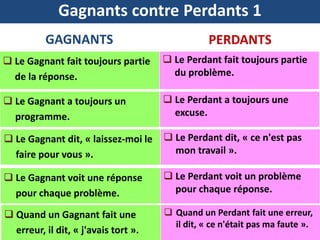
Attitudes positives.pdf
- 1. Gagnants contre Perdants 1 GAGNANTS PERDANTS Le Gagnant fait toujours partie de la réponse. Le Perdant fait toujours partie du problème. Le Gagnant a toujours un programme. Le Perdant a toujours une excuse. Le Gagnant dit, « laissez-moi le faire pour vous ». Le Perdant dit, « ce n'est pas mon travail ». Le Gagnant voit une réponse pour chaque problème. Le Perdant voit un problème pour chaque réponse. Quand un Gagnant fait une erreur, il dit, « j'avais tort ». Quand un Perdant fait une erreur, il dit, « ce n'était pas ma faute ».
- 2. Gagnants contre Perdants 2 GAGNANTS PERDANTS Les Gagnants disent, « je dois faire quelque chose ». Les Perdants disent, « quelque chose doit être fait ». Les Gagnants sont une partie de l'équipe. Les Perdants sont en dehors de l’équipe. Les Gagnants organisent et préparent pour gagner. Le mot clé est préparation. Les perdants voient la douleur de l’équipe, ils veulent gagner sans préparation. Quand le Gagnant dit, « c'est peut être difficile mais c'est possible ». Le Perdant dit, « c'est peut être possible mais c'est trop difficile ».
- 3. Gagnants contre Perdants 3 GAGNANTS PERDANTS Les Gagnants voient des possibilités. Les Perdants voient des problèmes. Les Gagnants croient en la victoire commune. Les Perdants croient que pour qu'ils gagnent quelqu'un doit perdre. Les Gagnants engagent des discussions dures mais avec des mots doux. Les Perdants engagent des discussions douces mais avec des mots durs.
- 4. Gagnants contre Perdants 4 GAGNANTS PERDANTS Le Gagnant pratique SEPARER et SITUER pour ne pas perdre de temps à chercher des choses. Le Perdant ne cherche pas le temps de pratiquer SEPARER et SITUER et gaspille le temps. Le Gagnant utilise les matériaux existants pour améliorer la situation. Le Perdant cherche toujours des matériaux inexistants. Le Gagnant demande comment pêcher des poissons. Le Perdant demande des poissons. Le Gagnant dit: comme il n’y a pas d’espace, je fais le 5S. Le Perdant dit: je ne peux pas faire le 5S car il n’y a pas d’espace. Le Gagnants sait que « Time is money ». Le Perdant gaspille le temps pour perdre le « Money ».